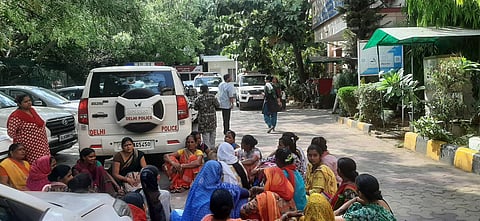
New Delhi- On April 25th, a distressing incident of workplace violence against a 40-year-old Dalit domestic worker in Vasant Kunj B2 block came to light. Over the past week, she endured both verbal and physical abuse over minor mistakes, culminating in a horrifying event where she was burned with a knife heated over a stove.
The helper had been employed since mid-March. After enduring such violence, she made the decision to leave her job but faced further brutality when she requested her rightful salary. She was viciously attacked the next morning, including being struck on the head and beaten with a belt.
Fortunately, some neighbors and union members intervened, rescuing her and calling for police assistance.
Medical procedures were carried out at Safdarjung Hospital until late evening on 26th April. This incident highlights a disturbing pattern of violence against domestic workers, drawing attention to their vulnerability.
According to the Sangrami-Gharelu Kaamgar Union, who were responsible for rescuing the victim, it took "7 hours of negotiations" for the police to file an FIR against the perpetrators. The FIR has been filed under IPC sections 323, 342, and 506.
DCP (Southwest) Rohit Meena has been quoted by multiple media outlets stating that investigations are underway. According to the FIR, the employer had allegedly struck her with a belt and verbally mistreated her over a minor issue previously.
Unfortunately, such incidents are not isolated in South Delhi. On April 14th, the police disclosed that a 20-year-old domestic helper in Greater Kailash, South Delhi, took her own life. Her body was found in a four-story residence in G.K. I on the morning of April 11th.
According to police reports, the woman had migrated from Mayurbhanj in Odisha to Delhi in search of employment. She had started working at the household on April 4th.
Investigators uncovered that two days prior to her death, she reached out to her sister, expressing her feelings of fear or apprehension.
This tragic event emphasizes the vulnerability faced by many workers, particularly those employed in domestic roles, and highlights the importance of addressing the challenges they encounter, both in terms of employment conditions and mental health support.
Anti-Slavery International estimates that more than four million domestic workers are present in India, constituting a significant segment of the workforce. However, they operate within an informal and unregulated sector, often working in private residences without formal recognition as employees but rather categorized as "informal help."
Domestic workers often encounter discriminatory, feudal, and caste-based practices that persist across time. These practices include, but are not limited to, the segregation of utensils, restrictions on accessing certain areas such as the ‘Puja room’, denial of restroom facilities, lack of seating arrangements, and various other forms of humiliation.
Caste exacerbates the challenges faced by domestic workers from marginalized backgrounds. It is not uncommon to witness situations where a Dalit domestic worker is assigned cleaning tasks, while someone from the employer's caste is hired as a cook, highlighting the deep-rooted caste dynamics within this industry.
The Mooknayak spoke to Sangrami-Gharelu Kaamgar Union member Shreya about the incident, who mentioned that the victim is experiencing significant trauma and physical pain. However, the support she has received from the union and her colleagues has been a source of strength for her.
She went on to explain about the societal issues that intertwine with the workers.
“The workers mainly belong to Dalit/Bahujan communities or minority religions. They are not given the due respect as a labour,” Shreya commented.
According to the union member, there are subtle signs of “othering” in cases even where physical violence is not there, which pertains to forcing the workers to eat or drink from separate utensils, not letting them use the same bathroom they clean and so on.
“Multiple unions who work with domestic workers have been raising the demand for separate laws to safeguard their rights and dignity, which would bring the house under the preview of a workplace.”
Shreya additionally claimed that despite the Delhi government expressing its intention for the past few years and the central government stating for the last two decades that such legislation would be enacted, it is yet to see the light of the day.
“Till the time the concept of private places is tackled,” continued the activist, “the mindset of ‘upper’ and ‘lower’ classes that owes its origin to the societal system cannot be combated.”
According to the All-India Central Council of Trade Unions, although some state governments have established minimum wage standards for domestic workers, enforcement remains lax.
Many domestic workers are forced to accept wages below the minimum due to extreme poverty, effectively subjecting them to conditions resembling forced labor. They are denied basic entitlements such as weekly offs, annual leave, and holidays, and any time taken off is often deducted from their meager wages.
Furthermore, they receive no bonuses and may only receive their employer's old clothes as compensation. The low wages compel many workers to take on excessive workloads, serving multiple households per day.
Working in isolation without the support of colleagues, domestic workers are highly vulnerable to various forms of exploitation, including sexual harassment.
While theoretically protected under the Sexual Harassment of Women At Workplaces (Prevention, Prohibition And Redressal) Act, 2013, the lack of local committees to address complaints renders this protection ineffective in many areas.
The absence of job security further exacerbates their vulnerability, making it difficult for them to assert their rights or report violations.
You can also join our WhatsApp group to get premium and selected news of The Mooknayak on WhatsApp. Click here to join the WhatsApp group.